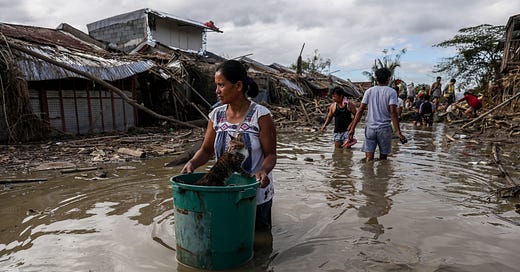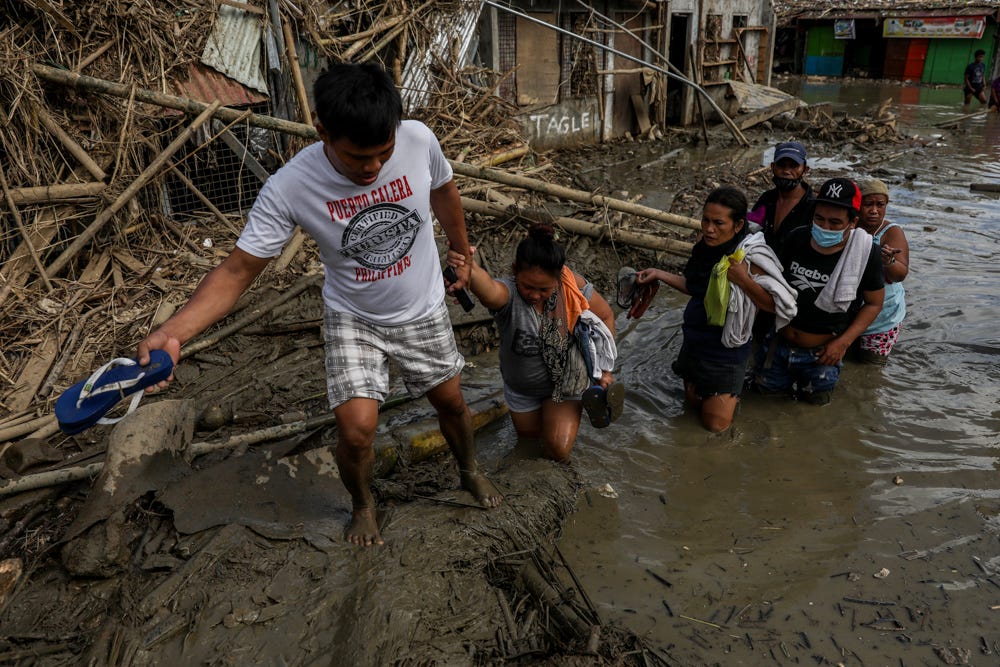#46 - Facing typhoons in the Philippines: when religion alone is no longer enough
By Purple Romero in Hong Kong
Welcome to this latest edition of From a Climate Correspondent. If you'd like to support us, check out our Patreon page, or invite us for a coffee over at KOFI page. Thanks for reading!
The aftermath of Typhoon Ulysses. Photo by Basilio Sepe / GreenpeaceTwo weeks ago I received a Facebook message from Laine Magno, a schoolmate of my brother in the Philippines. A powerful typhoon had unleashed itself upon the country, killing dozens and demolishing thousands of homes – and leaving many, like Magno, doing everything they can think of to help.
Magno’s family owned a small water station in Antipolo, a province bordering the city of Marikina, where some residents had been forced to climb onto their roofs to escape the mad gush of floodwaters on 11 November.
The 29-year-old engineer, along with other volunteers operating from Antipolo and other parts of Metro Manila, was now collecting and filling up water containers to provide clean drinking water to communities in need. Another group, bata.ph, then delivered these to the people stranded in damaged homes, their communities still swamped in mud, fallen trees and debris.
But even as Magno and other Filipinos do their best to recover from the devastation wreaked by Typhoon Vamco (known locally as Ulysses), they also fear their efforts being once again taken for granted by their government.
“I used to really like the word ‘resilience’ before, because it means standing strong amidst anything. But when you see people, especially those that have power and means to help, deliberately not doing anything so people have to rely themselves instead, it really triggers me,” she told me in a mix of Filipino and English.
“I couldn’t really express what I’m feeling now because it’s really frustrating. But people shouldn't really have to be resilient if others just do their job,” she said, cursing.
Faith and power
Magno also fears that Filipinos’ religious faith can sometimes get in the way of demands for government accountability.
“To seek hope and courage from God is okay,” she said. “But it shouldn't stop there, especially when it comes to physical things […] we face in the real world. We are governed by those people in power so we must seek or demand actions from people who said they would if given the opportunity to serve.”
The aftermath of Typhoon Ulysses. Photo by Basilio Sepe / GreenpeaceAnother Filipina, Mela Habijan, said she felt similarly. Habijan and her family live in Marikina, where they also had to brave floodwaters in 2009, when 23-meter high floods during Typhoon Ketsana subsumed parts of greater Manila.
“We can never address a problem by just merely praying. God has mercy, but people should also do something. The Supreme Being favours people of action,” she told me over Facebook.
"In the last 11 years, we are seeing more devastating effects of climate change, yet our leaders still don’t focus on addressing the problem — they focus more on politicking instead of public service.”
Laudato si’ in action
It’s not just memories of Typhoon Ketsana which were brought back, however, with this latest disaster. Typhoon Ulysses pummelled the Philippines just days after the country commemorated the 7th anniversary of Typhoon Haiyan, the strongest storm to make landfall in recent history.
Groups such as Living Laudato Si’ Philippines, an interfaith movement calling on financial institutions to divest from fossil fuels, have held events, such as a candle-lighting, to remember some 6,000 people who perished from the tragedy in 2013. And the organisation’s executive director, Rodne Galicha, said he understands why Filipinos would want to cling to their faith in times of hardship.
“When our communities are suffering the Philippine Church is there to extend her loving arms, to any sector of the society, whatever faith tradition or religion, to every human being - no discrimination,” he said.
But he added that Filipinos do now want to see more being done on the ground, with Laudato si’, Pope Francis’s famed 2015 encyclical on the climate crisis, yet to be seen in action in Philippine communities. “We still need to see ecology ministers embracing the social approach of Laudato si’,” he said.
Galicha stressed that the Filipinos’ call for more responsible governance is a step in the right direction - but that they must also show opposition to activities which harm the environment, such as mining, building highways in protected areas, land use conversion and the killing of environmental defenders.
“As Laudato si’ number 49 says: ‘Today, however, we have to realise that a true ecological approach always becomes a social approach; it must integrate questions of justice in debates on the environment, so as to hear both the cry of the earth and the cry of the poor.”
Purple Romero is a multimedia journalist who has written about climate change and environmental issues for local and international news organizations such as Alertnet Reuters, Eco-Business, Asia Sentinel and Mongabay. Find her on Twitter @purpleromeropo
This post was funded by climate investigation grant awarded to From A Climate Correspondent by the European Federation for Science Journalism (EFSJ) and funded by the BNP Paribas Foundation.
If you’d like to support us to publish more journalism from the front lines of climate change, please consider supporting us with a regular donation on Patreon or inviting us for a one-time coffee over at KOFI. You can also support use by signing up and sharing this article with others!
Must reads from the region
Climate Actions Started to Blossom in Various Fonts Amid the Prolonged COVID-19 Winter Muhammad Rizki Kresnawan, Rika Safrina, and Zulfikar Yurnaidi, ASEAN Centre for Energy
Some good news - a number of Southeast Asian countries have started to update their nationally-determined contributions or NDCs
Eco-resurgence for Asia: Invoking Indigenous Knowledge and Philosophy to Shape Economic Recovery and Sustainable Living, Nanda Kumar Janardhanan, Shuzo Nishioka, Eric Zusman, IGES
This paper discusses why indigenous knowledge and practices are important in shaping a green post-COVID-19 economic recovery.
Flooded Asia: Climate Change hits region the hardest, Nithin Coca, Nikkei Asia
An insight into the factors that make Asia especially vulnerable to flooding, and why this necessitates urgent adaptation and mitigation.
What else I’m reading
I’m currently reading a series of short stories produced by Filipino writers as a crowdfunding effort for families affected by Typhoon Ulysses. People can request that they write about certain topics - most of which tackled LGBTQI relationships - in exchange for cash donations to the victims of the disaster.
Who we are
From A Climate Correspondent is a weekly newsletter run by four journalists exploring the climate crisis from around the globe. We regularly also feature guest writers.
Lou Del Bello is an energy and climate journalist based in Delhi, India.
Jocelyn Timperley is a climate journalist based in San José, Costa Rica.
India Bourke is an environment journalist based in London, UK.
Mat Hope is investigative journalist based in Nairobi, Kenya.




